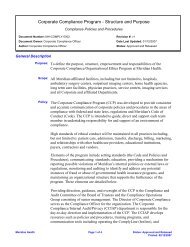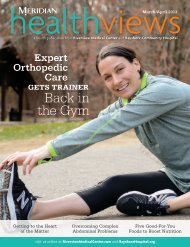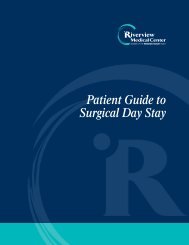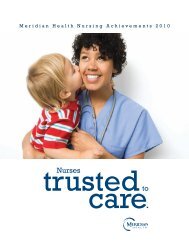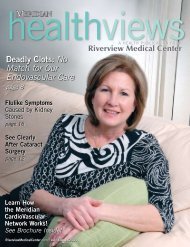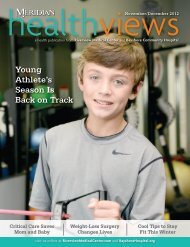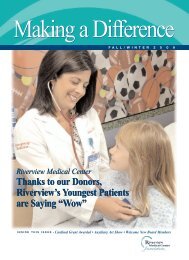Download the March/April 2009 issue - Riverview Medical Center
Download the March/April 2009 issue - Riverview Medical Center
Download the March/April 2009 issue - Riverview Medical Center
You also want an ePaper? Increase the reach of your titles
YUMPU automatically turns print PDFs into web optimized ePapers that Google loves.
Ocean medical centeR<br />
Ocean Vascular team Is There for Patient<br />
Eleanor “Ellie” Wilson, 66, of Brick<br />
loves to garden. While enjoying<br />
her hobby in spring 2008, she<br />
experienced excessive itchiness all over.<br />
As <strong>the</strong> wea<strong>the</strong>r got warmer, <strong>the</strong> itchiness<br />
increased and finally became unbearable.<br />
Ellie went to <strong>the</strong> Ocean Care <strong>Center</strong> in<br />
Point Pleasant. A blood test showed that<br />
her kidneys were in extreme failure.<br />
Itchiness is one initial symptom of<br />
kidney failure. O<strong>the</strong>r symptoms include<br />
fatigue, frequent hiccups, headache, lethargy,<br />
and unintentional weight loss.<br />
Ellie required hemodialysis, a process<br />
that removes <strong>the</strong> waste and excess fluids<br />
from your body when your kidneys are not<br />
capable of doing so. She was transferred to<br />
Ocean <strong>Medical</strong> <strong>Center</strong>. There, a temporary<br />
ca<strong>the</strong>ter was placed in her neck so she<br />
could start hemodialysis immediately.<br />
“With a state-of-<strong>the</strong>-art endovascular<br />
lab adjacent to our office, we can quickly<br />
treat patients,” explains Frank Sharp, M.D.,<br />
a board certified vascular surgeon and<br />
chief of surgery at Ocean <strong>Medical</strong> <strong>Center</strong>.<br />
“Our team of vascular surgeons is available<br />
24/7.”<br />
Then, since Ellie would require ongoing<br />
dialysis, a permanent vascular access — an<br />
AV fistula — needed to be placed in her<br />
Ellie Wilson has been impressed by <strong>the</strong> level of<br />
service she’s received at Ocean <strong>Medical</strong> <strong>Center</strong>,<br />
where <strong>the</strong> vascular and dialysis teams work<br />
toge<strong>the</strong>r to give her <strong>the</strong> help she needs.<br />
forearm. An AV fistula, generally referred<br />
to as a vascular access, connects <strong>the</strong> vein<br />
directly to an artery to allow greater blood<br />
flow through <strong>the</strong> vein. This also helps <strong>the</strong><br />
vein grow stronger so it can handle dialysis.<br />
Dr. Sharp and <strong>the</strong> rest of <strong>the</strong> team<br />
remained involved in Ellie’s care every step<br />
of <strong>the</strong> way. Even when Ellie had a problem<br />
with her vascular access one morning at<br />
7:00 a.m., Dr. Sharp saw her immediately.<br />
He cleared a blockage so she could receive<br />
her dialysis later in <strong>the</strong> day. “Dr. Sharp is<br />
very human — so caring,” says Ellie. “He is<br />
very concerned about his patients.”<br />
Dialysis patients at Ocean <strong>Medical</strong> <strong>Center</strong><br />
receive comprehensive care because <strong>the</strong><br />
vascular and dialysis teams work toge<strong>the</strong>r.<br />
“We have an open line of communication<br />
with our dialysis team,” says Dr. Sharp.<br />
When a patient has a problem with vascular<br />
access, such as Ellie did, <strong>the</strong> dialysis<br />
team can alert <strong>the</strong> vascular surgeons,<br />
who <strong>the</strong>n schedule <strong>the</strong> patient and clear<br />
any blockages. The dialysis center also<br />
uses technology that proactively screens<br />
patients to identify potential problems with<br />
<strong>the</strong>ir vascular access. A clear access helps<br />
ensure optimal blood flow during dialysis.<br />
Ellie continues her dialysis treatment<br />
three times a week. She feels much more<br />
like her old self again, has a great positive<br />
attitude, and continues to enjoy her<br />
gardening. • — Anne Marie Keevins<br />
aBout <strong>the</strong> DoCtor<br />
Frank J. sharp, M.D.<br />
Board certified in General and<br />
Vascular surgery<br />
Brick | 732-202-1500<br />
What’s New in dialysis?<br />
kiCk tHE ColA HABit<br />
to ProtECt Your<br />
FAMilY’s kidnEYs<br />
You may think bubbly, ice-cold<br />
cola is a drink you and your kids<br />
can share. But a recent study<br />
shows that cola may increase your<br />
risk for chronic kidney disease.<br />
in <strong>the</strong> study, people who<br />
drank two or more colas per<br />
day — diet or regular — were<br />
more than twice as likely to have<br />
kidney disease than those who<br />
didn’t. Soft drinks have been<br />
linked to diabetes and high blood<br />
pressure, which — along with<br />
family history — are risk factors<br />
for kidney disease.<br />
plus, cola contains <strong>the</strong> mineral<br />
phosphorus. Too much phosphorus<br />
causes ano<strong>the</strong>r important<br />
mineral — calcium — to leak<br />
from bones. Extra calcium can<br />
harden into stones in your kidneys,<br />
causing pain and boosting<br />
your odds for kidney disease.<br />
Find out at one of <strong>the</strong> three seminars being held in <strong>March</strong><br />
and <strong>April</strong> at ocean <strong>Medical</strong> <strong>Center</strong>. see page 21 for details.<br />
17<br />
Meridian HealthViews <strong>March</strong>/<strong>April</strong> <strong>2009</strong><br />
6116M B OMC 2_09 p1.indd 17<br />
1/26/09 11:16:44 AM



